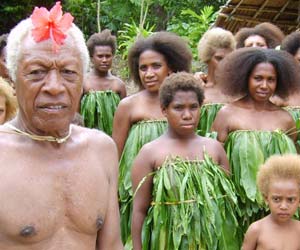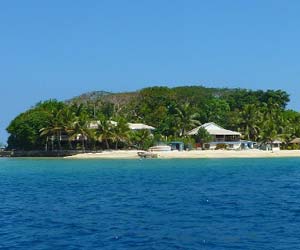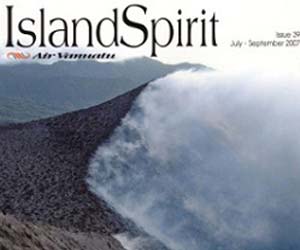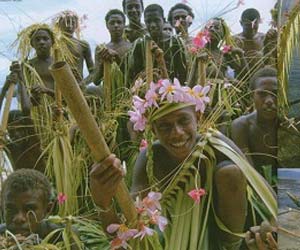By Simon Humphries.
Imagine living in a place where the earth was so organic and fertile that fences turn into trees and the hardest part about gardening is to try and stop plants and trees from growing. I have found such a place and with it happy, healthy people who live in sustainable harmony with their environment. It is just 2 and a half hours flight from Brisbane and a complete world away. In 2006 it was the number one country on the Happy Planet Index, which measured the health, happiness and environmental footprint of countries around the world. (www.happyplanetindex.org) They have the world’s most accessible active volcano, they invented land diving long before it became bungee jumping and have first class reefs, ship wrecks, beaches, jungles, 83 islands and 115 different languages in one of the most culturally diverse region of the world. Welcome to Vanuatu.
After spending a few months living in Vanuatu last year I am convinced that the locals there live in a tropical Garden of Eden. On the volcanic islands of Tanna and Ambrym, where the earth is a rich black volcanic soil, the whole island felt so alive and verdant I thought I would sprout roots or leaves if I stood still long enough. And this aliveness and vitality are in the people too. They are strong, healthy, athletic, and happy. After living in village bungalows and eating the local foods, walking through the jungles, climbing volcanoes, paddling outrigger canoes, snorkeling and seeing local gardens in the lush peaceful surroundings of nature I felt clear, open, healthy and very ALIVE! And why not? When you live on the side of an active volcano there is energy under your feet that seems to enrich everything!
Right now as you sit and read this there are very likely villagers on Ambrym Island climbing the silent steep ridges of a volcano to get to their gardens; preparing costumes and masks for a spectacular Rom dance, cultural festival or ceremony; thatching and weaving bamboo houses or a first aid post; or fishing from outrigger canoes with huge hooks to catch big deep sea fish with names like Wahoo and Mahi Mahi. In one village they might be making their own salt, sugar cane syrup, or coconut oil. There is a very good chance you would hear the sound of coconuts being scratched to make coconut cream. In North Ambrym fresh coconut milk is squeezed from strong hands over a hot firestone placed in a coconut shell, boiling and thickening the milk in seconds. The cream is poured onto fresh baked breadfruit that someone has beaten to soften and make doughy after taking it out of the ashes of an open fire. There will be chickens and a few pigs running through the village and probably a few kids and adults chasing the pets loudly through the village. Right now the young people might be playing a formidable game of volleyball or soccer. The air will definitely be filled with the sound of laughter and most people will be smiling for the sheer contentment of living life exactly as it is with people they care for in a land that provides all they need. No TV. No traffic. No busy noisy landscape of advertisements or city traffic to stir up the mind into its habitual chatter and stress. I felt so at peace on Ambrym, in awe at the sense of grandness the place has. And somewhere in a village, perhaps out at sea on a canoe, in a smoke filled kitchen or up in the gardens, there may be a local ni-van villager wondering right now what people are doing in other parts of the world at this time, wondering what your life is like, and wondering how many pigs you might own.
I had the privilege of discovering such a place on North Ambrym in Vanuatu. I stayed for 2 weeks and was won over by the vitality of the people and the land, by the villager’s friendliness, generosity, strength, and curiosity about the world beyond their own land.
‘Global village reaches remote Ambrym’
One local man told me that his people want to know about the ‘outside’ world because they accept they are no longer isolated from it. The villagers want to learn from travellers about customs and life in other cultures. With great respect and pride in his culture he said his community want to know about other’s ways so they can then choose what ‘cargo’ (anything from foreign cultures) to adopt or adapt to their situation and what cargo to leave alone. I was inspired and moved as he said, “Some things in our village are negotiable, and some things, like our kastom [customs] and traditional culture are not negotiable.” The villagers want to decide how they live. They want to be empowered. As I spoke with him I learnt a lot. Here I was with my apparently ‘civilised’ education and life in a ‘rich and developed’ country learning so much about community, ecology, sustainability, happiness and ‘forgotten’ simple qualities of life from people still very much in touch with the ancient spirits of their land, their tribal humanity, community, deep connectedness to the earth and it seems life itself.
I watched locals practice sustainability in their organic gardens (which look like jungles) and in their village community without needing to name or label what they do as ‘sustainable’. They simply live it. On Efate Island Joel from Bethel village gave me a fascinating tour of his gardens demonstrating companion planting, permaculture techniques, and insect and ‘pest’ management (for giant African snails and large land crabs). He explained the medicinal uses for plants. He cut sugar cane for me to taste and the unused piece he stuck back in the ground straight away without thinking about it so that it would grow into a new plant. No fertilizer is necessary in Vanuatu. I saw it clearly in this land that the earth has a life force that nurtures growth. Local gardening is often to simply dig a hole, bury a seed, bulb or cutting, then to come back in a few weeks and harvest. (This explains part of my own theory on why maintenance is a foreign concept in to ni-vans).
Almost everyone seems to know how to garden. An accountant on Efate explained to me how if cassava (also called manioc or tapioca) is planted on a certain angle it improves the yield of a crop considerably more than if it is planted vertically. People here live close to the land. Their garden is their bank. It feeds them, clothes them, and provides shelter and tools. And it is all free from Mother Nature. Selling their land is like selling their whole resource and cultural bank. There is a directness to living in Vanuatu that is a shift in experience and awareness for citified travellers who visit – like a breath of fresh air.
For tropical fruit lovers Vanuatu is taste bud heaven. Organic. Vine ripened. Garden not farm grown. Local foods are often cheap compared to back home. A few times in Vanuatu I would set my eyes on a giant mouth watering golden ripe organic paw paw the size of a small comet only to have my host throw it away because it was not good enough. For whom? Not me! This is gold compared to the plastic tasting gas ripened or rotting fruit I get back home. My mouth would gape open in disbelief as an absolute jewel of tropical fruit would be thrown away or given to the pigs. But sure enough, the next fruit my host brings out DOES taste even better. (Remember REAL FOOD is also seasonal so you won’t get everything all year round).
When you go to Vanuatu definitely get out and visit the local open air markets. They’re a lively communal affair. Have fun and point at things you have never seen before. Take photos of enormous sized fruits. Ask questions. Be amazed at what’s on offer. Supermarkets will seem like places for the culinary and cultural comatosed compared to Vanuatu marketplaces. Remember to smile and wiggle your eyebrows at people the way locals do to say ‘hello’ or ‘yes’. If you’re game, try and get someone’s attention by blowing them a loud kiss – all the locals do it. If you go with the flow, island life is very freeing, rewarding, healthy and fun. You can easily find yourself feeling happy for no particular reason when you’re in the smiling flow of island ‘elastic’ time. I asked one local why ni-vans smile so much. “Why not,” he replied. Why not indeed. I showed my ignorance and revealed my home cultures milieu for unhappiness and a penchant for not smiling at life each day. It is as if no-one has told the Vanuatu people they aren’t supposed to be happy. I like that a lot. I think they can teach the world a great deal.
If you would like to experience life in a Tropical Garden of Eden, then I highly recommend you find your way to the islands of Vanuatu, and take some photos, stories and thoughts about your life and your culture to share with the people. The island people will be thrilled and probably amazed to learn about your world as you will be to experience theirs.
I highly recommend a visit to the outer islands to meet the locals who are working very closely with the Brisbane (Australia) based company Vanuatu Custom Travel. They offer rare access to stunning locations, incredible people and unforgettable experiences in this tropical paradise. Vanuatu Custom Travel also supports grass roots sustainable community development and has volunteering options available if you would like to have a holiday and work on a project that contributes to a community. For more information see the website www.vanuatucustomtravel.com , email info@vanuatucustomtravel.com or call Sure Thing Travel on (02) 8212 4507 (Australia) .
In the rural villages of Vanuatu people know how to live. They live simply and simply LIVE. I have rarely felt so ALIVE in all my life as when I was there. That was the best gift they gave to me.
In the lush natural environment, culture and rich human nature of the local people, Vanuatu is abundant with wealth and qualities of life missing and disappearing in our ‘developed’ modern cultures. For this reason places like Vanuatu are priceless living Arks of wisdom and wonders that quite possibly hold the keys to a happy, healthy & sustainable future for all of us – if we approach such places with respect, openness and humility. Just go and you will know. Happy travels.




